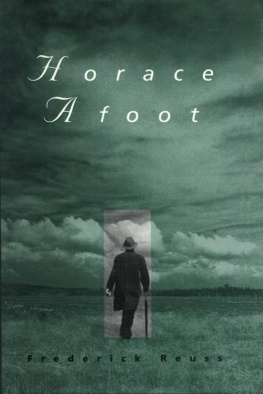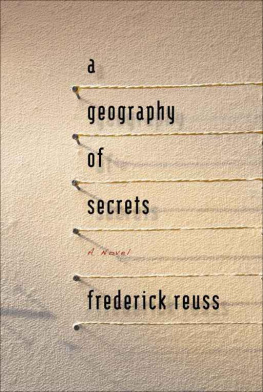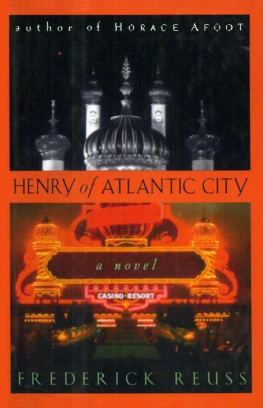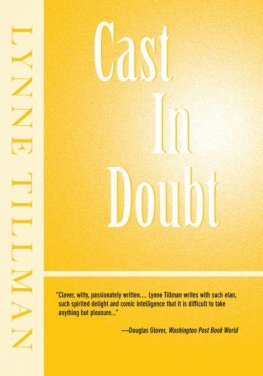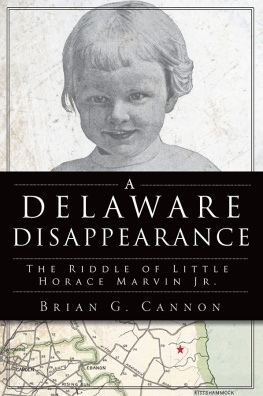
Horace
Afoot
Frederick Reuss
ebook ISBN: 978-1-84982-084-4
for more great titles visit:
www.skoobestore.com
M P Publishing Limited
12 Strathallan Crescent
Douglas
Isle of Man
IM2 4NR
United Kingdom
Telephone: +44 (0)1624 618672
email:
Copyright 1997 by Frederick Reuss
Published by:
MacMurray & Beck, Inc.
1649 Downing Street
Denver, Colorado 80218
All rights reserved. No part of this book may be reproduced or transmitted in any form or by any means, electronic or mechanical, including photocopying, recording, or any information storage and retrieval system, without written permission from the publisher, except for the inclusion of brief quotations in a review.
Library of Congress Cataloging-in-Publication Data
Reuss, Frederick, 1960
Horace afoot: a novel / by Frederick Reuss.
p. cm.
ISBN 1-878448-79-X
I. Title.
PS3568.E7818H6 1997
813.54dc21 97-21601
CIP
MacMurray & Beck Fiction: General Editor, Greg Michalson Horace Afoot cover design by Laurie Dolphin, interior design by Stacia Schaefer.
Publishers Note: This is a work of fiction. Names, characters, places, and incidents either are the product of the authors imagination or are used fictitiously. Any resemblance to actual events, locales, or persons, living or dead, is entirely coincidental.
The line on p. 38 from Robert Creeleys poem, The Immoral Proposition, is reprinted from The Collected Poems of Robert Creeley, 19451975 (Berkeley and Los Angeles: University of California Press, 1982), by permission of the author.
Complete Works of Horace, translated by Charles Passage
Copyright 1983 by Frederick Ungar Publishing Co., Inc.
Reprinted with the permission of The Continuum Publishing Group
For Gail
There are no streetcars in Oblivion. There arent any streetcars anywhere in America, as far as I know. I dont count the trolley cars in San Francisco. Since I moved here Ive been wishing streetcars would make a comeback. I know its hopeless. I hate internal combustion engines and the civilization that has been built on them. I shouldnt take it so personally. But I read in Selected Philosophical Essays that hatred of civilization is not necessarily an irrational projection onto the world of personal psychological difficulties. So I know its not just me.
My house is a rickety yellow thing at the dead end of West Street. The owner moved away and doesnt care what happens to it as long as he gets a check every month. Its a comfortable place, and I sometimes get the feeling that it has remained standing as a favor to me. Im sure Ill be its last occupant. Every evening I fix myself a plate of beans and rice, pour myself a glass of wine, then go upstairs and eat in bed listening to the night sounds from the woods behind the house. Tonight it is too hot to go to sleep, so I just sit with the empty bowl in my lap trying to imagine someone in China doing exactly the same thing. Of course the time difference would make it daytime on the other side of the world, so anyone sitting up in bed with an empty plate in their lap is bound to be ill or in prison or both. Right? I make a mental calculation. The worlds population is somewhere over five billion, so the probability is there. In fact, it is likely that there are thousands of us all around the globe doing exactly the same thing: sitting in bed with our empty bowl, staring at the wall. The process of calculation lulls me into a mild sort of hypnosis, and I find my thoughts wandering from the world of cozy musings in bed to the world of torture described in Amnesty International brochures, the ones that read: right now, today, the horrors of torture and political detention are everyday incidents in fully one-third of the worlds countries. I realize that what seems to me a comforting extrapolation, the projection of my measly being into the entire human universe, is also a bloody goddamn nightmare.
I reach for the phone and dial a number.
Horace here.
Hello?
Right now, today, the horrors of torture are everyday incidents in one-third of the worlds countries. I pause, wait for the click of the receiver.
Is that a fact? A womans voice.
Yes, it is. Do you ever find yourself wondering about the unspeakable things that are happening this very moment around the globe?
A pause. To tell you the truth, sir, I do not. Another pause. But I go to church every Sunday and pray to Almighty Christ that I never have to.
I consider how to respond, but my finger slips and I accidentally hang up on her. I cant remember the number Id dialed, which is a shame because I would have enjoyed talking to the old lady. There was a grain of frustrated reason in her voice, the voice of a heavy smoker.
I get out of bed and go into the kitchen, put my bowl in the sink, stand at the back door, and watch for falling stars. The outline of a large water tower teeters like a hydrocephalic child against the night sky. The name of the town is painted on it in matte black letters. You can read them during the day. OBLIVION. At night, despite the silhouette of the tower, you can see a big swath of sky. I turn off the kitchen light, sit on the stoop and scrutinize the summer night, listen to the chorusing crickets and cicadas. The sky is clear and brilliant with stars. I wish I hadnt broken the binoculars I confiscated from the kid next door. It would be nice to use them now. I ended up paying for them anyway, and now the kid is spying on me with a higher-powered set from a safer distance.
The evening wears on and I walk to the top of the street, turn left, and follow Old Route 47 out of town. The cornfields are about chest high, and from the slight elevation of the roadway I can see across them. All 180 degrees of the horizon are open to me. A few cars speed past. I step into the shadow of the field and hide as they blow by. At night the traffic on this side of town is light. Few use this road since the new thoroughfare was built several years ago. I like to walk out here for that reason.
Old Route 47 leads to the back of a factory that employs a good part of the town. Semantech, pronounced semmatech by the locals. They produce parts for cruise missiles and other weapons, and theyve been doing it for long enough now that everybody takes it for granted. A few months ago the president came through and gave a speech.
At eleven the shifts change and the parking lot becomes a sea of clustered headlights. The new thoroughfare, a four-lane road with highway signs and cloverleaf exits, takes this traffic to the east and around to the north end of town, where the new shopping malls are being built. The town has expanded in that direction, leaving the southern end, with its older houses and poorer neighborhoods, to a quiet, slow decay.
At a bend in the road is an ancient mound. Excavated around the turn of the century by the State Historical Society and the Bureau of American Ethnology, it is the highest elevation for miles around. A rotting picnic bench shaded by two medium-sized elm trees and a rusty plaque are the last signs of the states interest in it. I follow the path that winds around to the top, brushing the tall grass out of the way as I make my way up. The ground is hard and dry and my footsteps fall with a hollow, dusty thud. On top of the mound the nighttime vista spreads out, open fields and the constellation-filled summer sky. Moving directly south from the North Star, I find Hercules low over the horizon. Behind me the town of Oblivion, to my right the factory with its high fence and orange anticrime lamps. These are my coordinates. The rest is a dark sea of fields.
Next page
